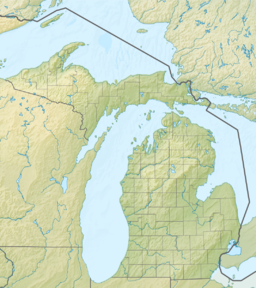Ford Lake (Michigan)
| Ford Lake | |
|---|---|
 Looking south from North Bay Park | |
| Location | Washtenaw County, Michigan |
| Coordinates | 42°13′02″N 83°35′06″W / 42.21722°N 83.58500°W |
| Type | Fresh water Reservoir |
| River sources | Huron River |
| Basin countries | United States |
| First flooded | 1931[1] |
| Surface area | 975 acres (395 ha)[2] |
| Max. depth | 30 ft (9.1 m) |
| Surface elevation | 682 ft (208 m)[3] |
| Islands | Big Island Park and several unnamed islands[4] |
| Settlements | Ypsilanti Ypsilanti Township |
Ford Lake is a fresh water artificial reservoir located in Washtenaw County in the U.S. state of Michigan. The lake was created from the construction of Ford Lake Dam (originally known as Rawsonville Dam) along the Huron River in the early 1930s.[1] The lake is named after business magnate Henry Ford.
The lake covers an area of 975 acres (395 ha) and has a maximum depth of 30 feet (9.1 m) near the eastern end.[2][5] The lake continues the flow of the Huron River, beginning approximately at the Interstate 94 bridge crossing in the city of Ypsilanti and ends at Ford Lake Dam along Bridge Road in Ypsilanti Township. A short distance after the Ford Lake Dam, the Huron River continues into Belleville Lake, which itself is a reservoir created by the French Landing Dam and Powerhouse.[6]
Recreation[edit]
Ford Lake is a recreational site for boating, personal watercraft, canoeing/kayaking, and fishing. Portions of the Border-to-Border Trail run along Ford Lake and are popular among bicyclists.[7] There are four public lakeshore parks within Ypsilanti Township: Ford Lake Park, Huron River Park, Loonfeather Point Park, and North Bay Park. The only boat launch for motorized vessels on the lake is within Ford Lake Park.[8]
Common fish within Ford Lake include bullhead catfish, channel catfish, common carp, crappies, northern pike, smallmouth bass, suckers, sunfish, bluegill, walleye, white bass, and yellow perch.[2][9] The lake was once used by the Michigan Department of Natural Resources to stock various fish, including tiger muskellunge, which are no longer present in Ford Lake.[10] The largest fish caught in Ford Lake is a common carp recorded in the state's Master Angler Entries at 36.25 inches (97.08 cm) long.[11]
Health concerns[edit]

Ford Lake often experiences algal blooms late in the summer, which must be frequently tested to determine their level of toxicity.[12] The Washtenaw County Health Department and Michigan Department of Health and Human Services monitors the water quality and issues advisories when the bacteria levels in the water may pose a health threat. Most algal blooms are green algae and pose no threat, but accumulating cyanobacteria and perfluorooctanesulfonatecan (PFOS) can result in harmful algal blooms that can have negative health affects. When this bacteria is present, prolonged contact with the water is not advised, although occasional contact with PFOS is not considered a health concern. Regardless of water quality, swimming is not a common recreational activity on the lake.[13][14]
When algae levels reach a high enough level to pose a threat, a "Do Not Eat" fish advisory is issued and posted at all access points along Ford Lake. Boating and fishing are still allowed, but fishermen are advised to catch and release only.[15]
References[edit]
- ^ a b Huron River Watershed Council (November 2015). "Ford Lake Dam" (PDF). Huron River Watershed Council. Retrieved August 22, 2019.
- ^ a b c Charter Township of Ypsilanti (April 4, 2019). "Ford Lake & Huron River Watershed". Charter Township of Ypsilanti. Retrieved August 23, 2019.
- ^ "Ford Lake Topo Map in Washtenaw County MI" (Map). TopoZone. 2019. Retrieved August 23, 2019.
- ^ Google (August 22, 2019). "Big Island Park" (Map). Google Maps. Google. Retrieved August 22, 2019.
- ^ Charter Township of Ypsilanti; Michigan Department of Natural Resources (n.d.). Bathymetric map of Ford Lake impoundment 2002 indicating water depth at 10-foot intervals beyond 5-feet deep (PDF) (Map). Scale not given. Charter Township of Ypsilanti. Retrieved August 22, 2019.
- ^ Huron River Dams Network (November 2015). "French Landing Dam" (PDF). Huron River Dams Network. Retrieved August 20, 2019.
- ^ Washtenaw County Parks & Recreation Commission (2019). Border-to-Border Trail: Trail Map (Map). Scale not given. Washtenaw County Parks & Recreation Commission. Retrieved August 23, 2019.
- ^ Charter Township of Ypsilanti (July 1, 2019). "Charter Township of Ypsilanti Park System". Charter Township of Ypsilanti. Retrieved August 23, 2019.
- ^ Michigan Department of Natural Resources (2019). "Ford Lake". Michigan Department of Natural Resources. Retrieved August 24, 2019.
- ^ Michigan Department of Natural Resources (2019). "Fish Stocking Database". Michigan Department of Natural Resources. Retrieved August 19, 2019.
- ^ Michigan Department of Natural Resources (2019). "Master Angler Entries (Washtenaw County: Ford Lake)". Michigan Department of Natural Resources. Retrieved August 18, 2019.
- ^ Fair, David (August 16, 2017). "Issues of the Environment: Improving Water Quality in Ypsilanti Township's Ford Lake". Ypsilanti, MI: WEMU-FM. Retrieved August 21, 2019.
- ^ City of Ann Arbor (August 31, 2018). "Michigan extends 'Do Not Eat' Fish Advisory for Huron River to Lake Erie" (Press release). City of Ann Arbor. Retrieved August 24, 2019.
- ^ "Harmful algae blooms detected in Ford, Belleville lakes". MLive. Booth Newspapers. September 17, 2018. Retrieved August 23, 2019.
- ^ Hicks, Mark (September 1, 2018). "State: Don't eat Huron River fish in 5 counties". The Detroit News. Retrieved August 22, 2019.

